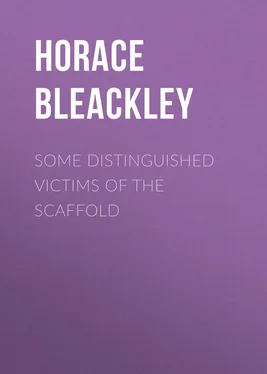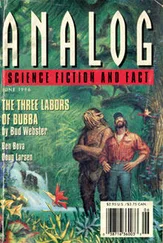Horace Bleackley - Some Distinguished Victims of the Scaffold
Здесь есть возможность читать онлайн «Horace Bleackley - Some Distinguished Victims of the Scaffold» — ознакомительный отрывок электронной книги совершенно бесплатно, а после прочтения отрывка купить полную версию. В некоторых случаях можно слушать аудио, скачать через торрент в формате fb2 и присутствует краткое содержание. Жанр: foreign_antique, foreign_prose, на английском языке. Описание произведения, (предисловие) а так же отзывы посетителей доступны на портале библиотеки ЛибКат.
- Название:Some Distinguished Victims of the Scaffold
- Автор:
- Жанр:
- Год:неизвестен
- ISBN:нет данных
- Рейтинг книги:5 / 5. Голосов: 1
-
Избранное:Добавить в избранное
- Отзывы:
-
Ваша оценка:
- 100
- 1
- 2
- 3
- 4
- 5
Some Distinguished Victims of the Scaffold: краткое содержание, описание и аннотация
Предлагаем к чтению аннотацию, описание, краткое содержание или предисловие (зависит от того, что написал сам автор книги «Some Distinguished Victims of the Scaffold»). Если вы не нашли необходимую информацию о книге — напишите в комментариях, мы постараемся отыскать её.
Some Distinguished Victims of the Scaffold — читать онлайн ознакомительный отрывок
Ниже представлен текст книги, разбитый по страницам. Система сохранения места последней прочитанной страницы, позволяет с удобством читать онлайн бесплатно книгу «Some Distinguished Victims of the Scaffold», без необходимости каждый раз заново искать на чём Вы остановились. Поставьте закладку, и сможете в любой момент перейти на страницу, на которой закончили чтение.
Интервал:
Закладка:
Not long before Christmas, to the great relief of his churlish host, the little Scotsman’s clumsy legs passed through the front door for the last time, and he set out for his brother’s seat at Crailing in the shire of Roxburgh. Yet, though his lengthy visit had come to an end, his spirit remained to rule the brain of the woman who loved him. Early in the year 1751 she received a box, containing a present from Cranstoun, a set of table linen, and some ‘Scotch pebbles.’ Lawyer Blandy viewed the stones with suspicious eyes, for he hated all things beyond the Cheviot Hills, but did not make any comment. The relationship between father and daughter had become cold and distant. Quarrels were constant in the unhappy home. Often in the midst of her passion she was heard to mutter deep curses against the old man. Indeed, so banished was her love that she talked without emotion to the servants of the likelihood of his death, in fulfilment of the witch’s prophecy.
Some weeks later, when another consignment of the mysterious ‘Scotch pebbles’ had arrived for Miss Blandy, it was noticed that her conduct became still more dark and strange. Slinking through the house with slow and stealthy tread, she appeared to shun all eyes, as though bent upon some hidden purpose. A glance within the box from the North would have revealed the secret. When the crafty accomplice found that she was unable to procure the means of taking her father’s life, he had been forced to supply her with the weapons. During the spring, the health of the old lawyer, who suffered more or less from chronic ailments, began to grow more feeble. His garments hung loosely upon his shrunken limbs, while the teeth dropped from his palsied jaws. The old witch’s curse seemed to have fallen upon the home, and, to those who looked with apprehension for every sign and portent, it was fulfilled in many direful ways. Early in June, Ann Emmet, an old charwoman employed about the house, was seized with a violent illness after drinking from a half-emptied cup left at Mr Blandy’s breakfast. A little later, Susan Gunnel, one of the maid-servants, was affected in a similar way through taking some tea prepared for her master. One August morning, in the secrecy of her own chamber, trembling at every footfall beyond the locked door, Mary Blandy gazed with eager, awestruck eyes upon a message sent by her lover.
“I am sorry there are such occasions to clean your pebbles,” wrote the murderous little Scotsman. “You must make use of the powder to them, by putting it into anything of substance, wherein it will not swim a-top of the water, of which I wrote to you in one of my last. I am afraid it will be too weak to take off their rust, or at least it will take too long a time.”
From the language of metaphor it is easy to translate the ghastly meaning. She must have told Cranstoun that the white arsenic, which he had sent to her under the pseudonym of ‘powder to clean the pebbles,’ remained floating on the surface of the tea. Possibly her father had noticed this phenomenon, and, not caring to drink the liquid, had escaped the painful sickness which had attacked the less cautious servants. But now she had found a remedy – ‘anything of substance!’ – a safe and sure vehicle that could not fail. Louder still in the ears of the lost woman rang the mocking words, “When the old man is dead you shall be happy.”
During the forenoon of Monday, the 5th of August, Susan Gunnel, the maid, met her young mistress coming from the pantry.
“Oh, Susan,” she exclaimed, “I have been stirring my papa’s water gruel”; and then, perceiving other servants through the half-open door of the laundry, she added gaily, “If I was ever to take to eating anything in particular it would be oatmeal.”
No response came from the discreet Susan, but she marvelled, calling to mind that Miss Blandy had said to her some time previously, noticing that she appeared unwell:
“Have you been eating any water gruel? for I am told that water gruel hurts me, and it may hurt you.”
Later in the day, her wonder was increased when she saw her mistress stirring the gruel in a half-pint mug, putting her fingers into the spoon, and then rubbing them together. In the evening the same mug was taken as usual to the old man’s bedroom. On Tuesday night Miss Blandy sent down in haste to order gruel for her father, who had been indisposed all day, and such was her solicitude that she met the footman on the stairs, and taking the basin from his hands, carried it herself into the parlour. Early the next morning, while Ann Emmet, the old charwoman, was busy at her wash-tub, Susan Gunnel came from upstairs.
“Dame,” she observed, “you used to be fond of water gruel. Here is a very fine mess my master left last night, and I believe it will do you good.”
Sitting down upon a bench, this most unfortunate old lady proceeded to consume the contents of the basin, and for a second time was seized with a strange and violent illness. Soon afterwards Miss Blandy came into the kitchen.
“Susan, as your master has taken physic, he may want some more water gruel,” said she. “As there is some in the house you need not make fresh, for you are ironing.”
“Madam, it will be stale,” replied the servant. “It will not hinder me much to make fresh.”
A little later, while tasting the stuff, Susan noticed a white sediment at the bottom of the pan. Greatly excited, she ran to show Betty Binfield, the cook, who bore no good-will towards her young mistress.
“What oatmeal is this?” asked Betty, significantly. “It looks like flour.”
“I have never seen oatmeal as white before,” said the maid.
Carefully and thoroughly the suspicious servants examined the contents of the saucepan, taking it out of doors to view it in the light. And while they looked at the white gritty sediment they told each other in low whispers that this must be poison. Locking up the pan, they showed it next day to the local apothecary, who, as usual in those times, was the sick man’s medical attendant.
Nothing occurred to alarm the guilty woman until Saturday. On that morning, in the homely fashion of middle-class manners, the lawyer, who wanted to shave, came into the kitchen, where hot water and a good fire were ready for him. Accustomed to his habits, the servants went about their work as usual. Some trouble seemed to be preying upon his mind.
“I was like to have been poisoned once,” piped the feeble old man, turning his bloodshot eyes upon his daughter, who was in the room.
“It was on this same day, the tenth of August,” he continued, in his weak, trembling voice, for his frame had become shattered during the last week. “It was at the coffee-house or at the Lyon, and two other gentlemen were like to have been poisoned by what they drank.”
“Sir, I remember it very well,” replied the imperturbable woman, and then fell to arguing with her querulous father at which tavern the adventure had taken place.
“One of the gentlemen died immediately,” he resumed, looking at her with a long, reproachful glance. “The other is dead now, and I have survived them both. But” – his piteous gaze grew more intense – “it is my fortune to be poisoned at last.”
A similar ordeal took place in a little while. At breakfast Mr Blandy seemed in great pain, making many complaints. As he sipped his tea, he declared that it had a gritty, bad taste, and would not drink it.
“Have you not put too much of the black stuff into it?” he demanded suddenly of his daughter, referring to the canister of Bohea.
This time she was unable to meet his searching eyes.
“It is as usual,” she stammered in confusion.
A moment later she rose, trembling and distressed, and hurriedly left the room.
There was reason for the old man’s suspicion. Before he had risen from his bed, the faithful Susan Gunnel told him of the discovery in the pan of water gruel, and both agreed that the mysterious powder had been sent by Cranstoun. Yet, beyond what he had said at breakfast, and in the kitchen, he questioned his daughter no more! Still, although no direct charge had been made, alarmed by her father’s hints she hastened to destroy all evidence that could be used against her. During the afternoon, stealing into the kitchen under pretence of drying a letter before the fire, she crushed a paper among the coals. As soon as she was gone the watchful spies – servants Gunnel and Binfield – snatched it away before it had been destroyed by the flames. This paper contained a white substance, and on it was written ‘powder to clean the pebbles.’ Towards evening famous Dr Addington arrived from Reading, summoned by Miss Blandy, who was driven on account of her fears to show a great concern. After seeing his patient the shrewd old leech had no doubt as to the symptoms. With habitual directness he told the daughter that her father had been poisoned.
Читать дальшеИнтервал:
Закладка:
Похожие книги на «Some Distinguished Victims of the Scaffold»
Представляем Вашему вниманию похожие книги на «Some Distinguished Victims of the Scaffold» списком для выбора. Мы отобрали схожую по названию и смыслу литературу в надежде предоставить читателям больше вариантов отыскать новые, интересные, ещё непрочитанные произведения.
Обсуждение, отзывы о книге «Some Distinguished Victims of the Scaffold» и просто собственные мнения читателей. Оставьте ваши комментарии, напишите, что Вы думаете о произведении, его смысле или главных героях. Укажите что конкретно понравилось, а что нет, и почему Вы так считаете.












